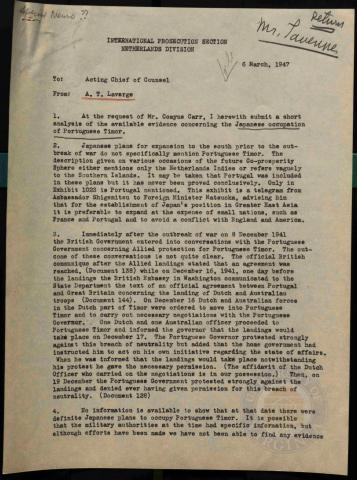
Page 1
| Parent | Japanese Occupation of Portuguese Timor |
|---|---|
| Date | 6 March 1947 |
| Language | English |
| Collection | Tavenner Papers & IMTFE Official Records |
| Box | Box 4 |
| Folder | General Reports and Memoranda from March 1947 |
| Repository | University of Virginia Law Library |
INTERNATIONAL PROSECUTION SECTION NETHERLANDS DIVISION
6 March, 1947
To:Acting Chief of Counsel
From: A. T. Laverge
1.At the request of Mr. Comyns Carr, I herewith submit a short
analysis of the available evidence concerning the Japanese occupation of Portuguese Timor.
2.Japanese plans for expansion to the south prior to the out¬break of war do not specifically mention Portuguese Timor. The description given on various occasions of the future Co-prosperity Sphere either mentions only the Netherlands Indies or refers vaguely to the Southern Islands. It may be taken that Portugal was included in these plans but it has never been proved conclusively. Only in Exhibit 1023 is Portugal mentioned. This exhibit is a telegram from Ambassador Shigemitsu to Foreign Minister Matsuoka, advising him that for the establishment of Japan's position in Greater East Asia it is preferable to expand at the expense of small nations, such as France and Portugal and to avoid a conflict with England and America.
3.Immediately after the outbreak of war on 8 December 1941
the British Government entered into conversations with the Portuguese Government concerning Allied protection for Portuguese Timor. The out¬come of these conversations is not quite clear. The official British communique after the Allied landings stated that an agreement was reached, (Document 138) while on December 16, 1941, one day before the landings the British Embassy in Washington communicated to the State Department the text of an official agreement between Portugal and Great Britain concerning the landing of Dutch and Australian troops (Document 144). On December 16 Dutch and Australian forces in the Dutch part of Timor were ordered to move into Portuguese Timor and to carry out necessary negotiations with the Portuguese Governor. One Dutch and one Australian officer proceeded to Portuguese Timor and informed the governor that the landings would take place on December 17. The Portuguese Governor protested strongly against this breach of neutrality but added that the home government had instructed him to act on his own initiative regarding the state of affairs.
When he was informed that the landings would take place notwithstanding his protest he gave the necessary permission. (The affidavit of the Dutch Officer who carried on the negotiations is in our possession.) Then, on 19 December the Portuguese Government protested strongly against the landings and denied ever having given permission for this breach of neutrality. (Document 128)
4.No information is available to show that at that date there were definite Japanese plans to occupy Portuguese Timor. It is possible that the military authorities at the time had specific information, but although efforts have been made we have not been able to find any evidence
